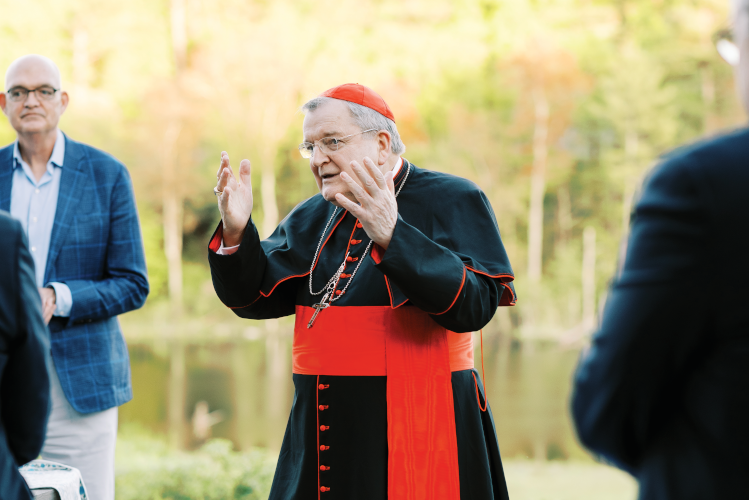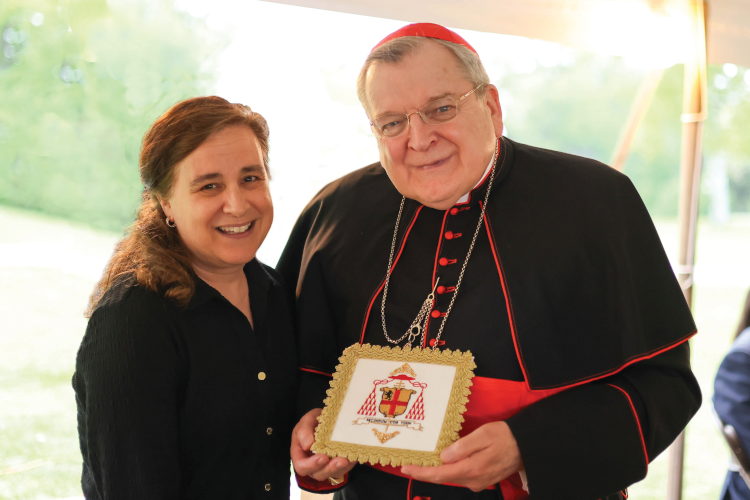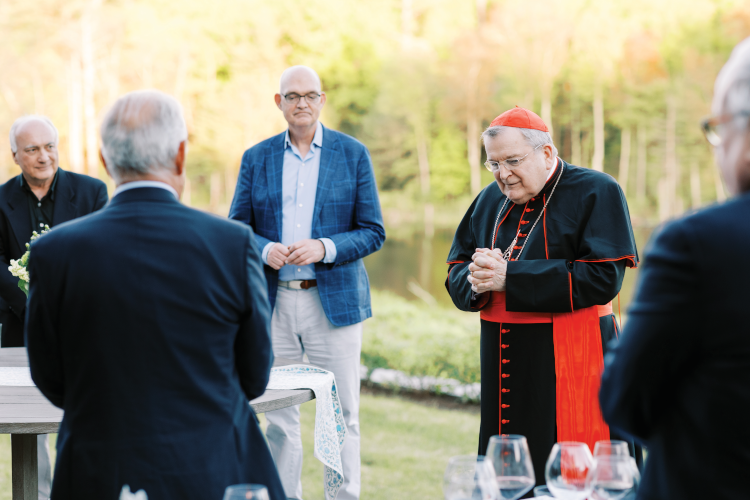- Home
-
About
 Fidelity & Excellence
Fidelity & ExcellenceThomas Aquinas College is unique among American colleges and universities, offering a faithfully Catholic education comprised entirely of the Great Books and classroom discussions.
-
A Liberating Education
 Truth Matters
Truth MattersTruth, and nothing less, sets men free; and because truth is both natural and supernatural, the College’s curriculum aims at both natural and divine wisdom.
-
A Catholic Life
 Under the Light of Faith
Under the Light of FaithThe intellectual tradition and moral teachings of the Catholic Church infuse the whole life of Thomas Aquinas College, illuminating the curriculum and the community alike.
-
Admission & Aid
 Is TAC Right for You?
Is TAC Right for You?Do you enjoy grappling with complex questions? Are you willing to engage in discussions about difficult concepts, with the truth as your ultimate goal?
-
Students & Parents
 Mind, Body & Spirit
Mind, Body & SpiritThere is always something to do at TAC — something worthwhile, something fulfilling, and something geared toward ever-greater spiritual and intellectual growth.
-
Alumni & Careers
 What Can You Do with a Liberal Education?
What Can You Do with a Liberal Education?Nothing speaks more to the versatility of the College’s academic program than the good that our alumni are doing throughout the Church and the world.
- Search
- Giving
An Interview with His Eminence Raymond Leo Cardinal Burke

Stay Close to Christ and Grow Closer to Him
This spring you inaugurated your nine-month novena to Our Lady of Guadalupe, which our students have been praying in New England and which culminates on her feast day, December 12. Could you tell us about why she is a fitting patroness for this time?
Well, in 1531, the Church universally was in a terrible crisis with the Protestant Revolt, but also in Mexico, there was a terrible attack on human life through the practice of human sacrifice among the Aztecs, with thousands of people violently killed. At the same time, there was developing a very bloody conflict between the Native Americans and the Spanish explorers and settlers. It was a miracle: Our Lady appeared to St. Juan Diego, and her message was so simple and direct. In times of great crisis — and surely we face such a time today, both in the world and in the Church, with a rebellion against God, the attack on the family, the attack on our human identity as man and woman, the attack on religious freedom, and ever-more diffuse confusion and error within the Church that are leading people away from Christ — it is Our Lady who will bring Christ to us again. I am confident that, through this nine-month novena, Our Lady is going to work many miracles in various parts of our nation and the world in order to bring us back to Christ, Who is our only salvation.
How would you counsel parents to choose a Catholic school for their children?
When I was a youngster, some 76 years ago, if parents chose a Catholic college, they could be sure that their son or daughter would be, first of all, taught the Catholic faith in a serious way, but also that they would be imbued with Catholic morals. But today, that isn’t the case, and parents have to seek out the sound Catholic universities or colleges. Thomas Aquinas College, both the New England campus and the California campus — and there are others too, like Christendom College, and Benedictine, and Belmont Abbey — still serves this important function. The Cardinal Newman Society is very helpful: It studies each college to indicate to parents where they can be certain that their son or daughter will be led deeper into life in Christ and the Church and become a strong member of Christ’s mystical Body.
You have been a very generous supporter of all Catholic colleges that are trying to remain faithful. Do you see anything that’s distinctive or unique about Thomas Aquinas College?
“Thomas Aquinas College is committed to the idea that Christ is not something added on to a university education, but that the knowledge and love of Christ in His holy church are integral to the whole education.”
Thomas Aquinas College is committed to the idea that Christ is not something added on to a university education, but that the knowledge and love of Christ in His holy church are integral to the whole education. We see this — and this is the way I was taught when I was young — that surely there is the fullness of the revelation, the Gospels, in the teaching of the Church. We can see glimpses of this even in ancient cultures. For instance, I remember when I was in high school, studying The Aeneid of Virgil, and the priest who was teaching us pointed out that the filial piety of Aeneas toward his father was a prefigurement of what the Church teaches about filial piety, one of the gifts of the Holy Spirit. At Thomas Aquinas College, this teaching is done in this very challenging way, through the Discussion Method, which helps students come to the fullness of the understanding of the text. It’s not a situation where a professor comes in and gives a lecture for an hour; rather, he sits with the students and achieves the same thing that he would with a lecture, while also helping them to enter into these texts directly and to uncover the truth that is in them. That’s a form of education that is really remarkable. It’s quite distinctive of Thomas Aquinas College. There may be one or another college like it, but I don’t think there are many.
Last year you celebrated the 15th anniversary of the shrine you erected to Our Lady of Guadalupe in La Crosse, Wisconsin. That church was built around the same time that Thomas Aquinas College completed Our Lady of the Most Holy Trinity Chapel in California, designed by the same architect, Duncan Stroik. What effect do you think these buildings have had on sacred architecture in the United States?
These are holy places, and when people enter, the beauty of the architecture lifts their minds and hearts to God. People say, “I have had an experience of a holy place, a place which has inspired me to want to be more Christ-like.” Churches should employ all the finest architecture and art in order to make the encounter with Our Lord in the sacraments as full as possible. It should lift us up to Him and draw us away from worldly considerations. People have said, “Oh, we can’t build churches like that anymore.” It seems ridiculous to me that people would say this in our time, when we have so many means that those who went before us didn’t have, and they, at great sacrifice, built the most beautiful temples to God. Yes, we can do that today, too. It requires great sacrifices on the part of many, but they are sacrifices which are connected directly to the encounter with God that takes place in the church building. We are blessed a hundredfold for all that we do to make our churches and chapels as beautiful as possible. St. Francis of Assisi, who, of course, embraced the life of poverty, made very clear in his letter to the clergy that, when it came to church, only the finest materials should be used, and everything should be done to make sure that the church was appointed in the finest way possible.

One of Mr. Stroik’s former students, Anthony Grumbine (’00), helped design the renovation of Our New England Chapel, which was built for nondenominational use and had to be adapted for Catholic worship. Having offered the Baccalaureate Mass there, what were your impressions?
Well, first of all, I hadn’t seen the Chapel as it was before, but I was greatly impressed with its very beautiful sanctuary, with the figures — St. Thomas Aquinas, Cardinal John Henry Newman, and, of course, Our Lady and the crucifix — as well as at the beautiful altar and the addition of a central aisle for processions. What also impressed me greatly, and this is an integral part of our sacred worship, was the music — beautiful singing from the choir and the finest music to accompany such a solemn high Mass.
“During the few days I was on campus, I had conversations with a number of students, and I saw how profoundly sincere their relationship with Christ is.”
Also, being the celebrant, I could see directly the fervor with which everyone was participating in the Eucharistic sacrifice and uniting themselves to the priest who was offering the sacrifice, making sacramentally present Christ’s sacrifice on Calvary. It was really, for me, I have to say, very moving. And I want to say, too, that this fervor was not a surprise to me. During the few days I was on campus, I had conversations with a number of students, and I saw how profoundly sincere their relationship with Christ is, and how they were searching to know God’s will more in their lives, to know how to put their gifts and talents at the service of Our Lord.
In your Commencement address, you discussed how our graduates need to discern what their vocations are. About 10 percent of our alumni go into the priesthood or the religious life. Do you have any advice for alumni who may be discerning these vocations?
Yes. For them, above all, it’s important to stay close to Our Lord and especially the Blessed Sacrament: daily Mass, if possible, of course, and then also to make visits to the Blessed Sacrament, because when Our Lord is calling somebody to the priesthood or the consecrated life, Satan gets busy to do everything he can to discourage the young person from even thinking that it would be possible to respond to the vocation. So we have to really stay close to Our Lord in the Eucharist, and then also regular confession, and daily prayer to Our Lord, saying, “You’ll help me to know my vocation and to embrace it with all my heart.” Then, of course, there is the importance of having a spiritual director, who assists you in sorting out the various thoughts that you have about it, the fears, concerns. Of course, you are blessed at the College to have these good priests, as well as many alumni priests and religious who periodically come to visit the College. Such visits are a good occasion for students to ask questions about vocations.
“We have witnessed a disintegration of the Catholic way of thinking, of Catholic culture. That simply has to be restored, and that will come by way of reason and faith.”
You said that we must avoid “the multiple distractions of false atheistic and materialistic ideologies” of our time. When those ideologies are so widespread, as they are today, how can one avoid them?
It’s a poisonous atmosphere, and so one has to take extraordinary measures of prayer and pay great attention to what one reads and studies, to make sure that it’s coherent with the truth, and not part of the kind of materialism and atheism which are so pervasive in today’s thought. That’s why a college like Thomas Aquinas College is so important. Education gives us the tools of critical reading, and through conversation with others, we come to a deeper knowledge of the truth. We can’t be lighthearted about this, and sometimes we are called to suffer for the sake of the truth and to suffer in combating these errors that, tragically, are so pervasive in our time.

Throughout the nearly 50 years of your ministry, the preeminent public issues we have confronted in this country have been those pertaining to life and family. In recent years, it seems, the ground has shifted, and we now have gender ideology, which presents a new challenge, inasmuch as it questions what it means to be human and even the very notion of truth. How should the Church respond to that challenge?
Today the attack is on reason itself and on nature itself. For instance, to say that I can change my nature: I was born a male and that I can, through the use of various chemicals and mutilation, make myself a woman — this is an attack on reason, on nature. So the Church must continue to teach the doctrines of the Faith in all their clarity, and that will lead us to questions of natural law, of the good order that’s written in our very human nature and which we must respect. That is, I think, at the risk of repeating myself, the importance of education as it is given at Thomas Aquinas College. It enables us to see these most fundamental questions, which have to do with the natural law, which have to do with who we are as human beings. We have witnessed a disintegration of the Catholic way of thinking, of Catholic culture. That simply has to be restored, and that will come by way of reason and faith. The two are always in harmony with each other, because God is the One Who gave us the gift of reason and blesses us with the gift of faith.
During your homily in the Baccalaureate Mass, you said that “by the grace of the Holy Spirit at work in us, even the weakest and poorest soul is capable of knowing Divine truth and practicing Divine love.” That is a radical message when the world tells us holiness is unattainable.
I have been a priest over these many years, and I have witnessed, in parishes and other settings in which I work, people who suffer from many weaknesses, but who — by turning to Christ and to the help of His grace — have lived good and holy lives. Christ has won the victory in their lives, and I believe there are many such stories. I have been blessed for the past few years to serve on the Congregation for the Causes of Saints. What is so striking is that, despite very different circumstances and obstacles, these individuals have not only lived good and holy lives, but heroically so. So none of us should be discouraged about ourselves; we can, too. We have a tendency to think of the saints as if they just kind of dropped out of Heaven perfect, but all of them lived in circumstances of daily living like our own, and they transformed those by following Christ faithfully.
When I was a boy, it was a great blessing that we were encouraged to read the lives of the saints. I think we need to get back to that practice. Christ is our salvation. Christ comes to us in the Church, which is His mystical Body. We are members. I would urge everyone, especially through the help of the Mother of Christ, whom He gave to us as our mother as He died on the Cross, to stay close to Christ and grow closer to Him. Use all the helps necessary to live each day in Christ, so that even the most ordinary day becomes truly extraordinary. God the Son Incarnate is acting through us, for our salvation and for the salvation of the world.

